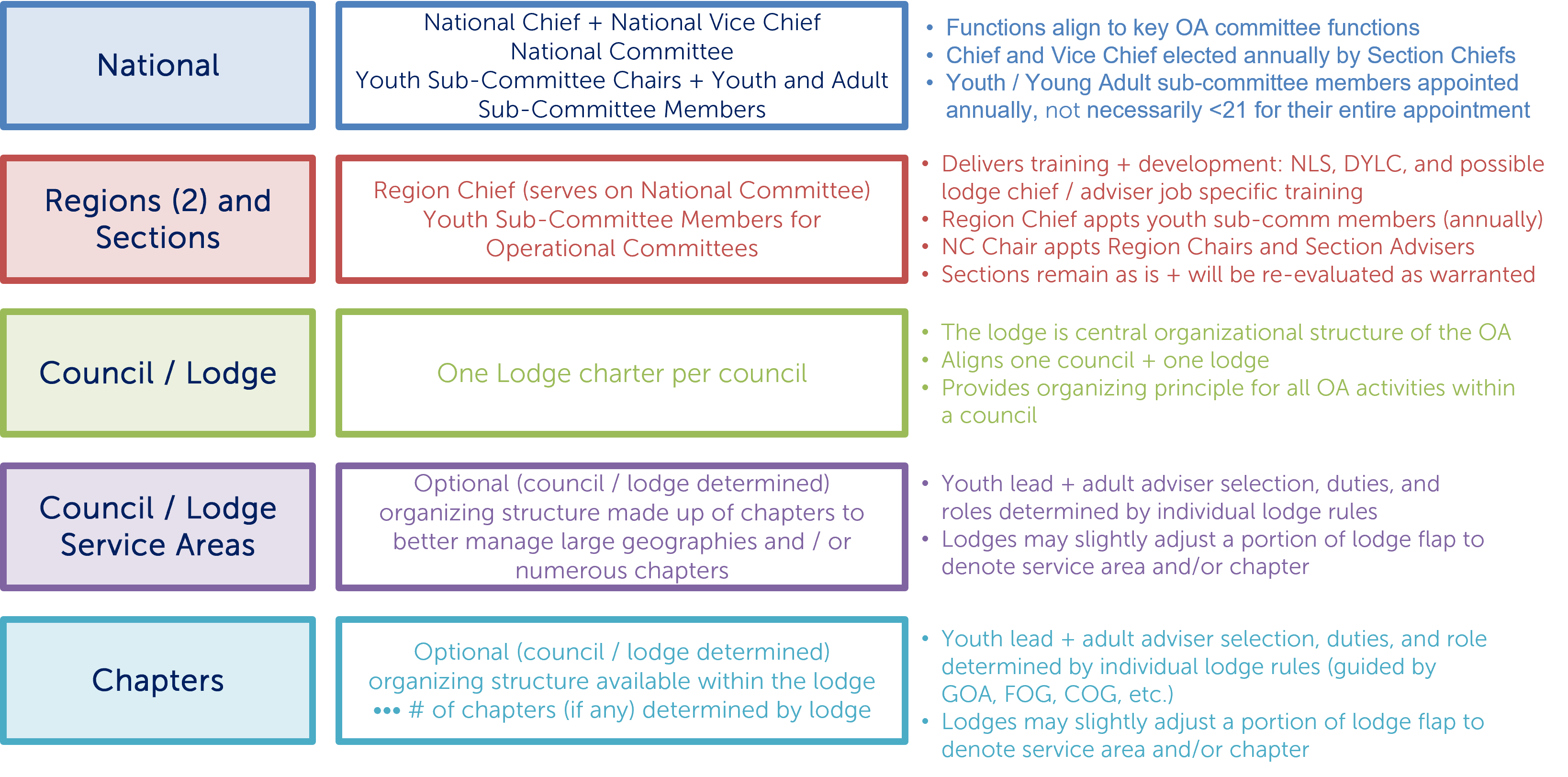
The Order of the Arrow has three distinct organizational levels beneath the national organization: lodges, sections, and regions. Lodges carry out the Order of the Arrow program at the local level and are chartered to BSA councils. Sections consist of several lodges within a geographic vicinity, and regions, in turn, consist of sections that each span half the country. Lodges, sections, and regions each have a distinct set of responsibilities that ensures the OA program runs smoothly.
National
At the national level, the Order of the Arrow is governed by the National Order of the Arrow Committee. The national committee sets program policy, directs the national program of the OA, and broadly manages the organization above the local lodge level. The committee is composed of the national chief and national vice chief (and their immediate predecessors), who are elected annually at the national planning meeting; the current and immediate past region chiefs, if appointed by the chairman; the volunteer chairman, who is appointed annually by the Chief Scout Executive; other volunteer members, as appointed by the chairman; and two staff members, the director of the Order of the Arrow and the associate director.
Regions
The Order of the Arrow is organized in two geographic regions: the Eastern and Gateway regions. Each region is led by a youth region chief, a volunteer region chairman, and a professional region staff adviser. The key three are, at the discretion of the region chairman, also supported by a region OA committee consisting of youth and adult volunteers. The region leadership team helps execute the national program on a more local level, implements the National Leadership Seminar (NLS) and Developing Youth Leadership Conference (DYLC), provides its member sections with resources, and facilitates communication between local organizations and the national OA committee.
Sections
An Order of the Arrow section consists of lodges within a geographic vicinity. Each section is led by a chief, vice chief, and secretary, who play a crucial part in supporting lodges within the section as well as planning an annual conclave. The section may lead training seminars, promote national programs of emphasis, and provide resources to local lodges. The section chief presides over the Council of Chiefs, attended by delegates of each member lodge.
Each year, the approximately forty elected section chiefs are invited to a national planning meeting. The section chiefs form the conference committee for the following year’s national program of emphasis, such as the National Order of the Arrow Conference (NOAC), which is held under the guidance of the National Order of the Arrow Committee.
Lodges
At the local level, lodges exist to serve BSA councils and individual units. The key leaders in the lodge are the youth lodge chief, volunteer adult lodge adviser, and professional staff adviser. The lodge chief presides over the Lodge Executive Committee, which is responsible for executing the annual program of the lodge. While each lodge is different, the Lodge Executive Committee typically consists of one or more vice chiefs, a secretary, and a treasurer, as well as chapter and/or service area chiefs and operating committee chairmen who are responsible for various aspects of the lodge’s program. Many lodges, especially large ones where additional structure is necessary, have service areas and chapters to chapters. These often align with BSA districts and execute the program of the lodge on a community level.
Service Areas
Some lodges may use newly recognized service areas to provide additional geographic organization between the chapter and lodge level. Service areas may be used in lodges to encapsulate multiple chapters, generally over large geographic areas, and to better deliver the organization’s programming at the local level.
Chapters
If a lodge has chapters, generally there is one chapter created for each district of the council. Each chapter has its own officers and advisers, the officers being elected by the youth Arrowmen OA members within the chapter, and the advisers being appointed by the Scout executive often with the consultation of the lodge adviser and district executive(s).
Chapters provide the ability to have meetings closer to home, and meetings and events can be scheduled to coincide with the district events. The chapter is central to providing quality unit visits for camping promotion, and unit elections.